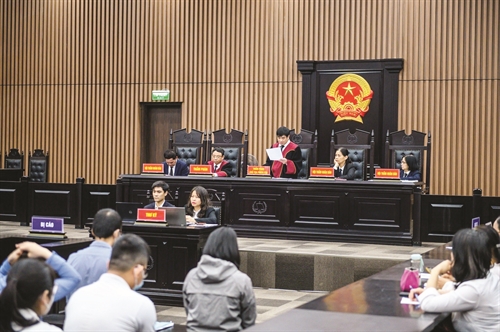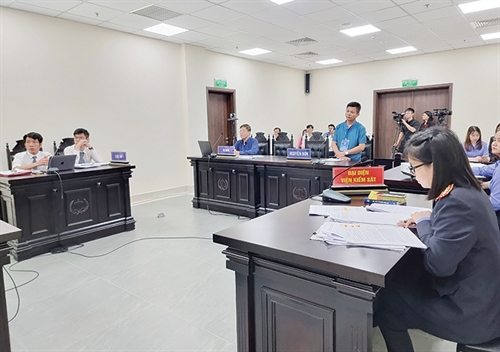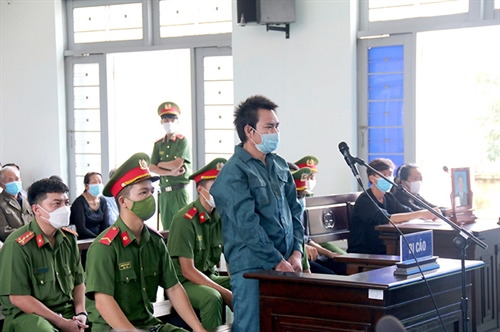Nguyen Van Nghia, LL.D. Vietnam Court Academy, Supreme People’s Court
 |
| The interface of the Portal of General Department of Civil Judgement Enforcement__Photo: VNA |
Enforcement of civil judgments and rulings means enforcing court judgments and rulings in order to ensure effectiveness and efficiency of the state management, rights and interests of the State, organizations and individuals, and realize justice, thus contributing to building an orderly, disciplined and stable society. Civil judgment enforcement through the performance of tasks and exercise of powers of enforcers of civil judgment enforcement agencies not only makes direct and active contributions to the protection of human rights and citizens’ rights but also helps promote national socio-economic development.
Mechanisms to secure civil judgment enforcement
Political security for civil judgment enforcement
The Party’s leadership in civil judgment enforcement is determined in not a few resolutions of the Party as well as the Constitution[1], laws and sub-laws on organization of operation of justice agencies. By these documents, the Party expresses its views and guidelines on improvement of institutions, assignment of functions and tasks, definition of coordination and control relations between state agencies and organizations in civil judgment enforcement activities.
The most important guideline on the mechanism to secure civil judgment enforcement was provided in Resolution 49/NQ-TW dated June 2, 2005, on the Judicial Reform Strategy through 2020 (Resolution 49/NQ-TW), and reaffirmed in the Politburo’s Conclusion 92-KL/TW dated March 12, 2014 (Conclusion 92-KL/TW), which states: “Building a mechanism to secure that all legally effective court judgments are enforced and violating administrative agencies strictly abide by court rulings”.
In addition, in order to further clarify the mechanism to secure civil judgment enforcement, the Party Central Committee’s Secretariat in 2021 issued Directive 04-CT/TW on enhancement of the Party’s leadership over the work of recovery of assets lost or misappropriated in corruption-related or economic crime cases. Among the important contents concerning civil judgment enforcement, this Directive sets requirements on “raising the sense of responsibility and effectiveness of coordination among functional agencies in the recovery of assets lost or misappropriated in corruption-related or economic crime cases; clearly defining the role and responsibility of examination and inspection agencies, auditing offices, proceeding-conducting bodies, civil judgment enforcement agencies, and steering committees for civil judgment enforcement at all levels; promptly applying measures to seize, hold in custody and distrain assets and land, and freeze bank accounts in the course of examination, inspection, auditing, investigation, prosecution and trial. Courts at all levels are required to strictly implement regulations on delivery of court judgments and documents related to distrained or frozen assets, and promptly correct or interpret court judgments and recommendations of competent civil judgment enforcement agencies. Civil judgment enforcement agencies are obliged to promptly handle distrained, frozen or seized assets in accordance with law in the course of investigation, prosecution and trial, and verify, search and handle assets in the stage of judgment enforcement.”.
Particularly, on November 9, 2022, the Party Central Committee adopted Resolution 27-NQ/TW on continued building and improvement of the socialist law-ruled state of Vietnam in the new period, requiring “the completion of the mechanism for improving quality and effectiveness of civil and administrative judgment enforcement in a time- and cost-saving fashion; and improvement of effectiveness of the coordination among related agencies in criminal, civil and administrative judgment enforcement.”.
Legal security for civil judgment enforcement
In pursuance to the Constitution’s Article 106[2], the National Assembly passed codes and laws providing legal security for civil judgment enforcement, including the 2008 Law on Enforcement of Civil Judgments, as revised in 2014 (the Law), the 2015 Civil Procedure Code, the 2015 Administrative Procedure Code, and the 2015 Criminal Procedure Code, as revised in 2017.
Specifically, Article 5 of the Law states: “In the course of judgment enforcement, lawful rights and interests of involved parties and persons with related rights and obligations shall be respected and protected by law.”
Article 19 of the Civil Procedure Code provides:
“1. A court’s legally effective judgment or decision shall be enforced and respected by all agencies, organizations and individuals; and shall be strictly served by related agencies, organizations and individuals.
2. Within the ambit of their respective tasks and powers, the court and agency or organization assigned to enforce the court’s judgment or decision shall strictly enforce it and bear responsibility before the law for such enforcement.
3. The court has the right to request the judgment enforcement agency to notify the progress and results of enforcement of the court’s judgment and decision. The judgment enforcement agency that directly organizes the enforcement shall report to the court.”
The highest legal security for requests for civil judgment enforcement is expressed in the Penal Code’s provisions on penal liability applicable to crimes against judicial activities, e.g., crime of failing to enforce judgments (Article 379), crime of failing to serve judgments (Article 380), and crime of obstructing judgment enforcement (Article 381).
Security for civil judgment enforcement through application of coercive measures
Coercion of civil judgment enforcement means using the state power to implement coercive measures provided by the law on civil judgment enforcement in order to secure the exercise of rights and performance of obligations stated in civil judgments or rulings. If judgment debtors fail to voluntarily execute judgments or rulings eligible for enforcement security, justice will still be realized by the State’s enforcement apparatus vested with the state power.
To make it more specific, Article 9 of the Law provides: “The State encourages involved parties to voluntarily execute judgments. Judgment debtors who have conditions for judgment execution but fail to voluntarily execute judgments will be subject to coercive enforcement under this Law.” Particularly, the time limit for voluntary execution of a judgment is 10 days after the judgment debtor receives or is properly notified of the judgment enforcement decision[3]. Upon the expiration of such time limit, the judgment debtor that fails to voluntarily execute a judgment will be coerced to do so[4].
The coercive enforcement of a judgment by a state power-vested force is always participated by related agencies, bodies and organizations in order to ensure publicity and objectivity and protect lawful rights and interests of involved parties so as to prevent power abuse by enforcers and civil judgment enforcement agencies as well the judgment debtor’s opposition. As a result, the coercive enforcement of a judgment must be carefully planned by the enforcer in accordance with law. Especially in case of necessity to mobilize coercion forces, such a coercive enforcement plan must have such contents as name of the person subject to the coercive measure; coercive measure to be applied; time and place of coercive enforcement; tentative plan to carry out coercive enforcement; and requirements on the forces participating in the enforcement. This plan should also be promptly sent to the same-level people’s procuracy and public security office, commune-level People’s Committee of the locality where the coercive enforcement is to be carried out, and related agencies, organizations and individuals. Related agencies, organizations and individuals are obliged to follow the coercive enforcement plan and the enforcer’s requirements. Within three working days after receiving the plan from the civil judgment enforcement agency, the same-level public security office will have to work out a plan to protect coercive enforcement[5].
Based on the above provisions, civil judgment enforcement agencies have resolutely applied coercive measures against judgment debtors who have conditions but fail to voluntarily execute civil judgments and rulings, in order to protect the strictness of law. The application of security interests and coercive measures is always subject to supervision by people’s procuracies at all levels in close coordination with local administrations and public security offices and related functional agencies[6].
Security for civil judgment enforcement through sanctions
Sanctions constitute a form of legal liability determined and imposed against violations of general behavior rules. Depending on characteristics of groups of social relations governed by law, sanctions are divided into criminal, administrative and civil ones.
In civil judgment enforcement, the Law’s Article 165 and relevant legal texts will apply for the handling of violating judgment debtors; agencies, organizations and individuals, and persons who abuse their positions and powers to intentionally obstruct judgment enforcement; and enforcers who intentionally fail to organize judgment enforcement or commit other violations. Violators will be sanctioned depending on the nature and severity of their violations. Specifically: Judgment debtors who intentionally fail to abide by judgments or rulings or fail to voluntarily execute judgment enforcement decisions will be administratively sanctioned or examined for penal liability in accordance with law. Meanwhile, agencies, organizations and individuals that fail to execute judgment enforcement decisions will be administratively sanctioned. If causing damage, they will have to pay compensations. Individual violators may also be disciplined or examined for penal liability. As for persons who abuse their positions or powers to intentionally obstruct judgment enforcement or force enforcers into illegally carrying out judgment enforcement; break seals of, consume, transfer, fraudulently exchange, hide or destroy material evidences or seized assets or distrained assets will be disciplined or examined for penal liability. If causing damage, they will have to pay compensations. Particularly, heads of civil judgment enforcement agencies who intentionally fail to issue judgment enforcement decisions or issue illegal ones, and enforcers who fail to strictly enforce judgments or rulings, delay judgment enforcement, apply illegal measures to coerce judgment enforcement, or breach ethical rules of enforcers will be disciplined or examined for penal liability. If causing damage, they will have to pay compensations in accordance with law.
Limitations and inadequacies
Though having helped civil judgment enforcement agencies record significant achievements, the mechanisms to secure civil judgment enforcement have over the recent years revealed limitations and inadequacies which can be analyzed below.
Regarding political security for the state management of judgment enforcement
According to the Judicial Reform Steering Committee’s Report on the eight years’ implementation of the Judicial Reform Strategy (2005-13), the realization of the Party’s guidelines on judicial reform in general and judicial reform in civil judgment enforcement in particular still saw limitations and inadequacies. This include slow and incomprehensive direction of study and implementation of guidelines set forth in Resolution 49-NQ/TW, and uncoordinated and unscheduled organization of the performance of judicial reform tasks. Besides, many important tasks stated in the Judicial Reform Strategy have remained unperformed.
In addition, a number of major guidelines on the state management of judgment enforcement, especially mechanisms to secure judgment enforcement, are not yet institutionalized into provisions of the revised Law on Enforcement of Civil Judgments, Civil Procedure Code, Law on Organization of People’s Courts, etc., though these documents directly regulate or are the most relevant to the organizational structures, tasks and powers of people’s courts and people’s committees in civil judgment enforcement.
Regarding institutional security for judgment enforcement
Despite the fact that the legal framework on civil judgment enforcement is fairly complete, legal texts guiding the Law and relevant regulations remain inconsistent and impractical, failing to facilitate effective and efficient civil judgment enforcement. Specifically, the law on civil judgment enforcement and the law on banks and credit institutions lack specific provisions on the responsibility of banks and credit institutions to provide information about bank accounts of judgment debtors to bailiffs and judgment creditors.
Another setback is the inconsistency between the Law and the Civil Procedure Code and relevant laws. For example, the Law’s Article 2.2 stipulates that it is required to immediately enforce first-instance court judgments and rulings on alimony, salary or wage payment, severance allowance, job-loss allowance, working capacity loss allowance or compensation for loss of life or damage to health or mental harm, or reemployment of dismissed employees, and first-instance rulings on application of provisional urgent measures though they might be appealed or protested against. Meanwhile the Civil Procedure Code’s Article 482.2 additionally specifies first-instance court judgments and rulings subject to immediate enforcement, including those on social insurance, unemployment insurance or health insurance or decisions on the legality of strikes.
It is therefore necessary to address such inconsistency, especially between the Law and guiding texts and relevant specialized laws that are enacted later, by making the above provisions more inclusive, e.g., adding the phrase “and other court judgments, rulings and documents as specified by law”.
Regarding security through application of coercive measures
The implementation of coercive measures for civil judgment enforcement has over the recent time revealed some shortcomings. For example, the Law does neither provide specific principles of coercion of civil judgment enforcement nor refer to law-specified general principles regarding judgment enforcement coercion. Besides, the Civil Code’s new issues concerning usufruct, the right of superficies, and easement have not yet been concretized into provisions on coercion of civil judgment enforcement.
This situation necessitates the comprehensive revision of coercive measures provided in the Law toward ensuring consistency with the Civil Code’s provisions on the responsibility to perform obligations and enhancement of the role of courts, proceeding-conducting bodies and local administrations in coercive enforcement of civil judgments.
Regarding security through sanctions
The reality shows that sanctions imposed in the field of civil judgment enforcement have not been proven effective and deterrent enough. For instance, the Law’s Article 44 obligates judgment debtors to truthfully declare their assets and conditions for judgment execution, fully provide documents related to their assets upon request of competent persons, and take responsibility before law for declared information. Nevertheless, in reality these persons have rarely been willing to properly perform such obligation since doing so might affect their interests. These persons may be fined VND 1-3 million under Article 52 of Government Decree 110/2013/ND-CP (as revised under Decree 67/2015/ND-CP and also stipulated under Article 64.2 of Decree 82/2020/ND-CP). This fine level is definitely not heavy enough to prevent judgment debtors from dodging the information provision obligation or from making untruthful declaration or providing inadequate information. Moreover, the power to impose such fine does not rest with judgment enforcers who have to propose the fine imposition to the Director of the Civil Judgment Enforcement Department for decision, thus prolonging the judgment enforcement period.
Recommendations
In order to shorten the judgment enforcement period and ensure the desired effect of judgment enforcement, it is suggested to come up with the solutions below.
Firstly, it is proposed to translate as soon as possible the Party’s a guidelines and the State’s policies mentioned above into provisions of a new Law on Civil Judgment Enforcement superseding the Law and other relevant laws.
Secondly, it is a need to revise Decree 82/2020/ND-CP toward imposing higher fines on judgment debtors for their violations in civil judgment enforcement.
Thirdly, judgment enforcers should be vested with more powers in sanctioning of administrative violations for them to proactively handle civil judgment enforcement-related matters.
Fourthly, it is advised to resolutely apply coercive measures and sanctions against administrative violations of judgment debtors before proposing the prosecution and public trial of the crimes of failing to serve judgments and obstructing judgment enforcement (Articles 380 and 381 of the 2015 Penal Code).
Last but not least, lawmakers should consider additionally prescribing judgment debtors’ acts of intentionally dispersing assets; transforming assets; transferring, donating or giving assets as gifts to others; putting assets in mortgage or pledge or using assets as collateral, etc., as acts involved in the crime of failing to serve judgments or violating the sealing and distrainment of assets and freezing of accounts under the Penal Code in order to raise the deterrence of fines and coercive measures and have legal grounds for handling violations in civil judgment enforcement.-
* The Vietnamese version of this article is published on Nghien cuu Lap phap (Legislative Studies) Journal, No. 14(486), July 2023 (http://www.lapphap.vn/Pages/TinTuc/211860/Co-che-bao-dam-thuc-thi-hieu-qua-ban-an--quyet-dinh-dan-su-cua-Toa-an-o-Viet -Nam.html).
[1] Article 4 of the Constitution.
[2] Article 106 of the Constitution stipulates: “Judgments and rulings of people’s courts which have taken legal effect must be respected by agencies, organizations and individuals and strictly served by concerned agencies, organizations and individuals.”
[3] Article 45.1 of the Law.
[4] Article 46.1 of the Law.
[5] Specifically, the public security office is responsible for arranging necessary forces and means to maintain order and protect scenes, promptly preventing and handling acts of dispersing assets, obstructing or opposing the judgment enforcement, detaining opposing persons, and instituting a criminal case when seeing a sign of crime (Article 72.4 of the Law).
[6] According to the Ministry of Justice’s statistics, in 2021 alone, civil judgment enforcement agencies issued 11,370 decisions on application of coercive measures, including 7,814 ones not involving the mobilization of coercion forces (327 more than the 2020’s figures), and 3,556 cases involving the mobilization of coercion forces (326 less than the 2020’s figures). In that year, 1,356 judgment debtors voluntarily executed their judgments before the coercive enforcement thereof was organized.









